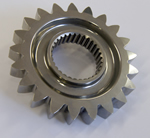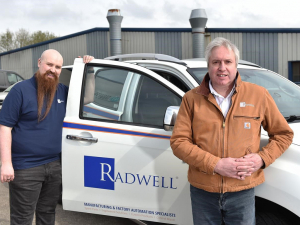Nadcap – hard work, but worth the effort?
18th October 2012

When it comes to industrial quality procedures, aerospace is one of the most demanding industries to do business with. Every component must checked, tested and logged to an incredible level of detail and, just as importantly, all processes, procedures and standards are documented to ensure traceability to a depth many engineers would find baffling.
As a result of these quality demands, the vast majority of precision aerospace components are made in house. Those that aren't, and there aren't many, are manufactured by companies prepared to have their products, processes and procedures regularly run through with a fine-tooth comb.
One of the key quality standards for the aerospace industry is Nadcap, managed by PRI, a non-profit organisation set up to address the development of performance standards and the administration of quality assurance, accreditation and certification programs.
Nadcap is described by PRI as an international, independent manufacturing process and product assessment and certification service for the purpose of adding value, reducing total cost and facilitating relationships between subscribers and suppliers.
In short, it manages a set of common standards set by various bodies in the aerospace industry and then ensures that those certified comply fully with their requirements. Going far and beyond most company's in-house quality procedures, Nadcap adds another level of detail to what is already an exacting science.
Nadcap accreditation is not impossible; it just takes a certain mindset and work ethic that can see the positives in terms of reputation, self improvement, orders and, of course, the bottom line.
Hemel-Hempstead based Micro Precision is one company that has taken the plunge and has successfully operated two Nadcap approved processes for the last few years at its 20,000 square foot production and testing facility. The company has held Nadcap accreditation for chemical processing (Nital Etch inspection) since 2004 and NDT (magnetic particle and liquid penetrant testing) since 2006.
Micro Precision supplies a number of leading aerospace OEMs and Tier One suppliers with a selection of components, including motor cores for aerospace pumps and generators and geared components for multiple applications throughout the airframe. Using its Nadcap accredited facilities, it is able deliver its customers with a level of confidence that they would normally only see by manufacturing these components in-house.
So, why did Micro Precision seek Nadcap accreditation? Peter Skelton, General Manager explains: We actually handle a fairly significant amount of aerospace work and the post manufacturing testing of these components is vital. We used to have to sub the testing out, which lead to inevitable lead time issues and a heavy reliance on third parties. Therefore the decision was made to get our own accreditation as we realised that there would not only be time benefits, but it would also allow us to manage costs more effectively.
It is an onerous task, he continues, but if I am honest, it is not that far removed from the quality procedures we already had in place. We have never been a 'get it out of the door quick' company, we believe in doing a job right first time and to a quality level that wins us repeat orders, Nadcap simply put an official stamp on what we were already doing.
The Nadcap qualification process involves multiple steps, the first of which is an eAudit, where companies complete a preliminary questionnaire. Once this has been completed and approved, the supplier then has to send a hard copy of its quality-control manual and procedures to the auditor 30 days prior to the audit visit. The audit then takes place and any subsequent remedial action is performed. Once this is satisfactory and any identified non-conformance reports have been closed the accreditation status is determined by the Nadcap management council and a certificate is issued.
It may sound straightforward, but the level of detail being assessed by the auditor is daunting. To us it is also an ongoing process, Skelton elaborates.The initial audit is just the start of it. We are then subject to regular re-approval audits, the frequency of which is determined by our test scores. If you get a good score, the frequency of audits gets longer. We are currently in the second 18-month cycle and if our scores are satisfactory, we will move on to a 24 month cycle, which is a long as it gets. So, not only are we Nadcap accredited, we are performing to such a level that they are confident enough to audit us every two years rather than annually.
Is it worth it? I think that the Nadcap certificate certainly makes us more attractive to other aerospace customers, Skelton explains, but its benefits are not restricted to this industry alone. Nadcap accreditation speaks volumes, it means that you are doing something to an exacting standard for one of the most demanding industries in the world and this is certainly an appealing facet for other industries. We also do NDT and chemical processing for Formula One teams, they don't have their own industry standards, primarily due to their highly competitive business model, but Nadcap certainly paints a positive message for them.
We are certainly proud of how far we have got in the timescale that we have been doing the processing and to get to the 24-month audit window is no mean feat. A new set of checklists for conventional machining is also being prepared by Nadcap, but has yet to be mandated by the major stakeholders as yet, but you can be sure that Micro Precision is geared up to address this as and when it arrives.
Terry Grubb, Managing Director, says: Micro-Precision has been in business for over 30 years, quietly supplying subcontract and make-complete engineering work to some of the highest profile commercial engineering operations in the world - from the latest generation of aircraft to Formula 1 cars. We have grown organically by providing an absolutely top-class service, and this has now allowed us to make this latest investment in new machinery and factory expansion in order to satisfy demand.
As engineering production becomes ever more streamlined and tolerances and materials become ever more exacting, our value to our customers is on the increase, mainly because of our quality and our flexibility. If a customer requires just one part, manufactured to the same tolerances and put through the same test regime as a larger batch would, then we can do it. Low-to-medium volume production is our current forte, and having continually invested in the very latest high accuracy machines, the best people and the most exacting approvals such as Nadcap, we believe we are in the right position to provide the type of precision engineering today’s growth sectors demand.
One of the key quality standards for the aerospace industry is Nadcap, managed by PRI, a non-profit organisation set up to address the development of performance standards and the administration of quality assurance, accreditation and certification programs.
Nadcap is described by PRI as an international, independent manufacturing process and product assessment and certification service for the purpose of adding value, reducing total cost and facilitating relationships between subscribers and suppliers.
In short, it manages a set of common standards set by various bodies in the aerospace industry and then ensures that those certified comply fully with their requirements. Going far and beyond most company's in-house quality procedures, Nadcap adds another level of detail to what is already an exacting science.
Nadcap accreditation is not impossible; it just takes a certain mindset and work ethic that can see the positives in terms of reputation, self improvement, orders and, of course, the bottom line.
Hemel-Hempstead based Micro Precision is one company that has taken the plunge and has successfully operated two Nadcap approved processes for the last few years at its 20,000 square foot production and testing facility. The company has held Nadcap accreditation for chemical processing (Nital Etch inspection) since 2004 and NDT (magnetic particle and liquid penetrant testing) since 2006.
Micro Precision supplies a number of leading aerospace OEMs and Tier One suppliers with a selection of components, including motor cores for aerospace pumps and generators and geared components for multiple applications throughout the airframe. Using its Nadcap accredited facilities, it is able deliver its customers with a level of confidence that they would normally only see by manufacturing these components in-house.
So, why did Micro Precision seek Nadcap accreditation? Peter Skelton, General Manager explains: We actually handle a fairly significant amount of aerospace work and the post manufacturing testing of these components is vital. We used to have to sub the testing out, which lead to inevitable lead time issues and a heavy reliance on third parties. Therefore the decision was made to get our own accreditation as we realised that there would not only be time benefits, but it would also allow us to manage costs more effectively.
It is an onerous task, he continues, but if I am honest, it is not that far removed from the quality procedures we already had in place. We have never been a 'get it out of the door quick' company, we believe in doing a job right first time and to a quality level that wins us repeat orders, Nadcap simply put an official stamp on what we were already doing.
The Nadcap qualification process involves multiple steps, the first of which is an eAudit, where companies complete a preliminary questionnaire. Once this has been completed and approved, the supplier then has to send a hard copy of its quality-control manual and procedures to the auditor 30 days prior to the audit visit. The audit then takes place and any subsequent remedial action is performed. Once this is satisfactory and any identified non-conformance reports have been closed the accreditation status is determined by the Nadcap management council and a certificate is issued.
It may sound straightforward, but the level of detail being assessed by the auditor is daunting. To us it is also an ongoing process, Skelton elaborates.The initial audit is just the start of it. We are then subject to regular re-approval audits, the frequency of which is determined by our test scores. If you get a good score, the frequency of audits gets longer. We are currently in the second 18-month cycle and if our scores are satisfactory, we will move on to a 24 month cycle, which is a long as it gets. So, not only are we Nadcap accredited, we are performing to such a level that they are confident enough to audit us every two years rather than annually.
Is it worth it? I think that the Nadcap certificate certainly makes us more attractive to other aerospace customers, Skelton explains, but its benefits are not restricted to this industry alone. Nadcap accreditation speaks volumes, it means that you are doing something to an exacting standard for one of the most demanding industries in the world and this is certainly an appealing facet for other industries. We also do NDT and chemical processing for Formula One teams, they don't have their own industry standards, primarily due to their highly competitive business model, but Nadcap certainly paints a positive message for them.
We are certainly proud of how far we have got in the timescale that we have been doing the processing and to get to the 24-month audit window is no mean feat. A new set of checklists for conventional machining is also being prepared by Nadcap, but has yet to be mandated by the major stakeholders as yet, but you can be sure that Micro Precision is geared up to address this as and when it arrives.
Terry Grubb, Managing Director, says: Micro-Precision has been in business for over 30 years, quietly supplying subcontract and make-complete engineering work to some of the highest profile commercial engineering operations in the world - from the latest generation of aircraft to Formula 1 cars. We have grown organically by providing an absolutely top-class service, and this has now allowed us to make this latest investment in new machinery and factory expansion in order to satisfy demand.
As engineering production becomes ever more streamlined and tolerances and materials become ever more exacting, our value to our customers is on the increase, mainly because of our quality and our flexibility. If a customer requires just one part, manufactured to the same tolerances and put through the same test regime as a larger batch would, then we can do it. Low-to-medium volume production is our current forte, and having continually invested in the very latest high accuracy machines, the best people and the most exacting approvals such as Nadcap, we believe we are in the right position to provide the type of precision engineering today’s growth sectors demand.
Similar articles
More from Micro-Precision Gear Technology Ltd.
- Non-Destructive Testing - how far should you go 2nd July 2013
- Nadcap – hard work, but worth the effort? 18th October 2012
- UK Precision Gear specialist Microprecision announces plans for expansion in both India and China 13th September 2012
- Leading UK precision engineering company invests over £2million in new machine tools and factory expansion 28th November 2011












Write a comment
No comments